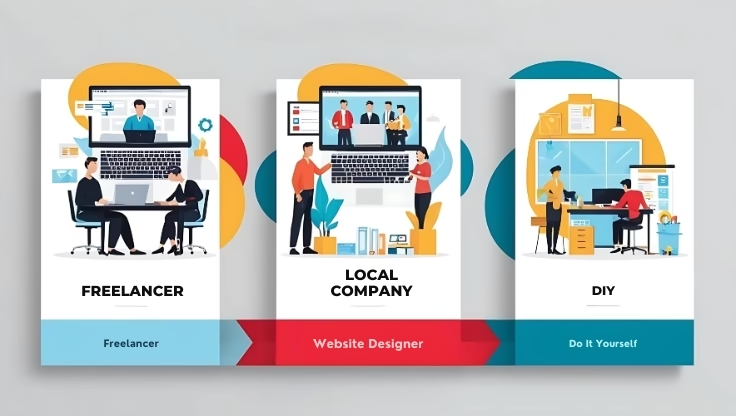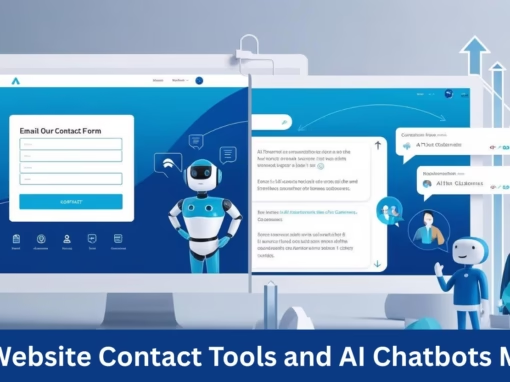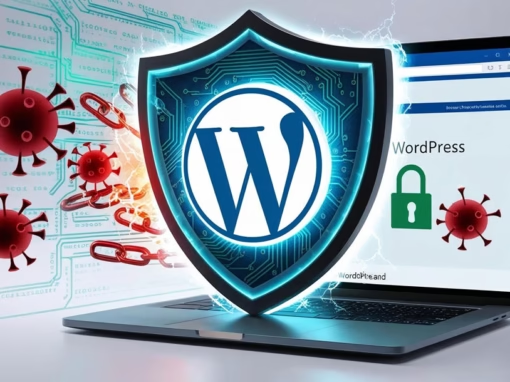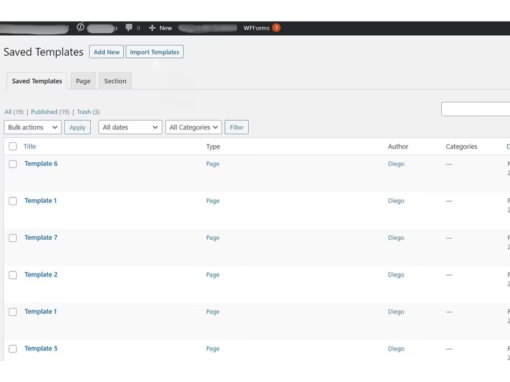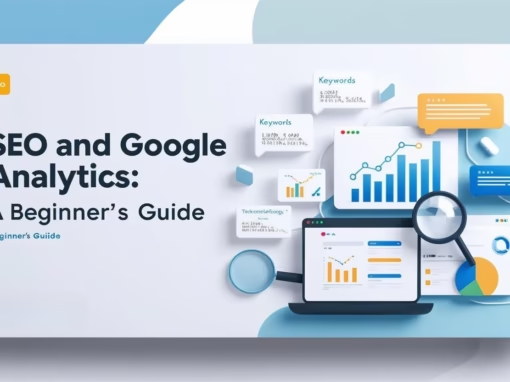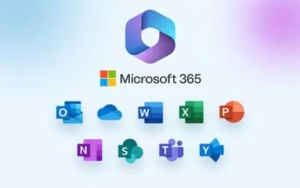In today’s digital-first world, your business website is often the first impression you make on potential customers. A well-designed website can boost your credibility, improve user experience, and drive conversions. But when it comes to creating your website, you have three main options: hiring a freelancer, working with a local web design company, or designing it yourself using DIY tools.
Choosing the right option can feel overwhelming, especially if you’re not familiar with web design. In this SEO-optimized guide, we’ll break down the pros and cons of each approach, backed by research and statistics, to help you make an informed decision. Whether you’re a small business owner, a startup, or an entrepreneur, this article will help you find the best solution for your needs.
Why Your Website Design Choice Matters
Your website is more than just an online brochure—it’s a powerful tool for attracting customers, building trust, and growing your business. According to a 2023 report by Sweor, 75% of users judge a company’s credibility based on its website design. Additionally, 88% of online consumers are less likely to return to a website after a bad experience.
With so much at stake, it’s crucial to choose the right approach for designing your website. Let’s explore the three main options in detail.
Option 1: Hiring a Freelancer for Your Website Design
What Are the Benefits of Hiring a Freelancer?
- Cost-Effective Solution
Freelancers are often more affordable than web design agencies. According to Upwork, the average hourly rate for freelance web designers ranges from 25to100, depending on their experience and location. This makes freelancers a great option for small businesses or startups with limited budgets. - Flexibility and Customization
Freelancers offer flexibility in terms of project scope and timelines. You can hire them for specific tasks, such as designing a logo or optimizing your site for mobile, without committing to a long-term contract. - Personalized Attention
Working with a freelancer means you’ll have direct communication with the person handling your project. This can lead to a more personalized experience and quicker feedback loops. - Niche Expertise
Many freelancers specialize in specific areas, such as e-commerce websites, WordPress development, or UX/UI design. If your project requires niche expertise, you can find a freelancer who fits your needs perfectly.
What Are the Drawbacks of Hiring a Freelancer?
- Limited Resources
Freelancers usually work alone, which means they may lack the resources to handle large or complex projects. If your website requires advanced features like custom integrations or extensive backend development, a freelancer might not be the best choice. - Reliability Issues
Freelancers often juggle multiple projects simultaneously, which can lead to delays or missed deadlines. A 2022 report by Freelancer.com found that 35% of clients reported issues with freelancers missing deadlines or delivering subpar work. - Lack of Accountability
Unlike agencies, freelancers may not have a formal contract or legal framework in place. If something goes wrong, it can be challenging to hold them accountable.
Option 2: Working with a Local Web Design Company
What Are the Benefits of Working with a Local Company?
- Professional Quality
Local web design companies often have a team of experts, including designers, developers, and project managers, who can deliver high-quality results. According to a 2023 Clutch survey, 89% of businesses that hired a web design agency were satisfied with the final product. - Comprehensive Services
Agencies typically offer end-to-end services, from initial consultation and design to development, testing, and ongoing maintenance. This can save you time and effort, as you won’t need to coordinate with multiple freelancers or handle technical issues yourself. - Accountability and Support
Agencies usually have formal contracts, project timelines, and support agreements in place. If something goes wrong, you have a legal framework to fall back on. Additionally, many agencies offer ongoing support and maintenance packages. - Local Expertise
Working with a local company can be beneficial if you want to collaborate in person or if your business targets a local audience. They may have a better understanding of your market and customer base.
What Are the Drawbacks of Working with a Local Company?
- Higher Costs
Hiring a local web design company is often more expensive than working with a freelancer. According to a 2023 report by WebFX, the average cost of a custom website design by an agency ranges from 5,000to30,000, depending on the complexity of the project. - Longer Timelines
Agencies often have multiple clients and projects, which can lead to longer turnaround times. If you need your website up and running quickly, this might not be the best option. - Less Flexibility
Agencies may have rigid processes and workflows, which can limit your ability to make changes or request custom features during the project.
Option 3: Designing Your Website Yourself
What Are the Benefits of Designing Your Website Yourself?
- Cost Savings
Designing your website yourself is the most cost-effective option. Platforms like Wix, Squarespace, and WordPress offer affordable templates and drag-and-drop tools that make it easy to create a website without any coding knowledge. - Full Control
When you design your website yourself, you have complete control over every aspect, from the layout and color scheme to the content and functionality. This can be particularly appealing if you have a clear vision for your site. - Learning Opportunity
Building your own website can be a valuable learning experience. You’ll gain a better understanding of web design principles, SEO, and digital marketing, which can benefit your business in the long run.
What Are the Drawbacks of Designing Your Website Yourself?
- Time-Consuming
Designing a website from scratch can be time-consuming, especially if you’re not familiar with web design tools. According to a 2022 survey by WebsiteBuilderExpert, it takes an average of 3-6 months for a beginner to design and launch a website. - Limited Expertise
Unless you have a background in web design or development, your website may lack the polish and functionality of a professionally designed site. This can negatively impact user experience and your brand’s credibility. - Scalability Issues
DIY website builders are great for simple sites, but they may not be suitable for complex projects or businesses that plan to scale. Custom features, integrations, and advanced SEO optimization can be challenging to implement on your own.
Key Statistics to Help You Decide
- Freelancers vs. Agencies: A 2023 Upwork report found that 59% of businesses prefer hiring freelancers for web design projects due to cost savings and flexibility. However, 41% of businesses still opt for agencies, citing higher quality and reliability as the main reasons.
- DIY Website Builders: According to W3Techs, 43% of websites are built using CMS platforms like WordPress, but only 12% of these websites are considered “high-quality” by industry standards.
- Satisfaction Rates: A 2023 Clutch survey revealed that 89% of businesses that hired a web design agency were satisfied, compared to 72% of those who hired freelancers and 65% of those who designed their websites themselves.
How to Choose the Right Option for Your Business
When deciding between a freelancer, a local company, or designing your website yourself, consider the following factors:
- Budget: Freelancers and DIY tools are more affordable, while agencies offer higher quality at a higher cost.
- Timeline: Freelancers are faster, agencies take longer, and DIY projects can be time-consuming.
- Complexity: Freelancers and DIY tools work for simple sites, while agencies are better for complex projects.
- Technical Skills: If you’re comfortable with web design tools, DIY might work. Otherwise, hire a professional.
- Long-Term Goals: If you plan to scale, investing in a professional website from the start is wise.
Final Thoughts: Which Option Is Right for You?
There’s no one-size-fits-all answer to designing your business website. Each option—freelancers, local companies, and DIY tools—has its pros and cons. By evaluating your budget, timeline, technical skills, and long-term goals, you can make an informed decision that aligns with your business needs.
Remember, your website is an investment in your brand’s future. Whether you choose a freelancer, a local company, or the DIY route, prioritize quality and user experience to ensure your website drives results.


